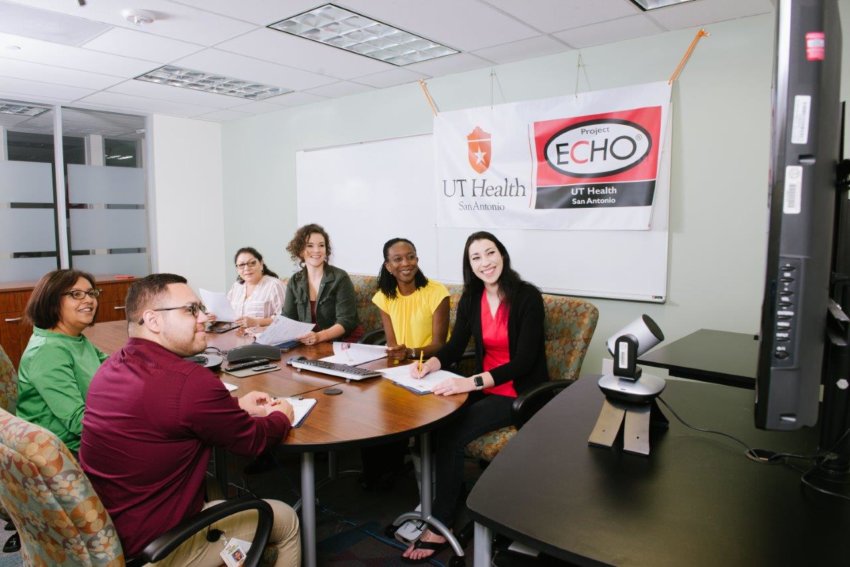Contact: Steven Lee, 210-450-3823, lees22@uthscsa.edu
A program housed at The University of Texas Health Science Center at San Antonio, also known as UT Health San Antonio, is reaching out to rural communities grappling with limited health care access and worker shortages, among other barriers.
“Telementoring,” or technology-enabled mentoring, uses telecommunication technology to deliver training, education and support to health workers.
Throughout the week of Oct. 25-29, the national Rural Telementoring Training Center (RTTC), based at UT Health San Antonio’s Center for Research to Advance Community Health (ReACH), will host virtual events to celebrate the launch of Resources, Information, Support, and Education – RISE for Rural Telementoring, an array of tools and resources to support health care delivery in rural settings.
The events will highlight the theme, “Emerging Voices in Rural Telementoring,” including a photography competition, micro-lectures from leaders in telementoring and stories from community members and rural health workers. All events are open to the public and free to attend.
In the era of COVID, this work is more important than ever, as it allows the RTTC to share knowledge rapidly, provide critical support to health workers and form connections in a time of isolation, turnover and burnout.
“Telementoring is a valuable mechanism for facilitating access to health education and peer-support for health workers in rural America,” said Waridibo Allison, MD, PhD, FACP, program director of the RTTC, and associate professor of infectious diseases at UT Health San Antonio.
Rural populations face persistent barriers to health, including: reduced resources; hospital closures; workforce shortages; limited access to specialists including experts in mental health and substance-use disorders; lack of insurance coverage; geographic and transportation barriers; and stigmatization of diseases that discourage community members from seeking care. Still, rural contexts present tremendous opportunities for innovation and collaboration to improve health.
“Telementoring provides resources for workforce development and task-shifting often needed in rural communities,” Dr. Allison said. “We define health worker broadly as anyone involved in health care delivery.”
The overarching goal of RISE for Rural Telementoring is to support the delivery of evidence-based, high-quality telementoring programs that expand health care access and support workforce development across rural America.
RISE for Rural Telementoring provides training and tools for six models of:
- “Extension for Community Healthcare Outcomes (ECHO®),” a well-established model for guided practice and lifelong learning that connects community-based health workers with experts to discuss cases and share best practices.
- Individual consultations between health care providers and subject matter experts.
- Webinars.
- Online modules and curricula.
- Podcasts.
- Community health clubs, which involve groups that gather for structured sessions to support each other, learn about a health topic, and organize action on a health issue that is important to their community.
The RTTC formed from a three-year, nearly $3 million grant in September 2020 from the Health Resources and Services Administration of the U.S. Department of Health and Human Services. This funding is part of the agency’s Rural Health Communities Awards, a sustained effort to improve care in rural communities.
Program collaborators include Cardea Services, Oklahoma State University Center for Health Sciences, Purdue University, the National Organization of State Offices of Rural Health (NOSORH), the National AHEC Organization and the ECHO Institute at University of New Mexico.
To learn more, please visit www.ruraltelementoring.org, RTTCinfo@uthscsa.edu, Twitter: @TeamRTTC or LinkedIn: www.linkedin.com/in/rttc.
This project is supported by the Health Resources and Services Administration (HRSA) of the U.S. Department of Health and Human Services (HHS) under grant number U5ARH39480 and title Rural Telementoring Training Center for grant amount $2,999,677. This information or content and conclusions are those of the author and should not be construed as the official position or policy of, nor should any endorsements be inferred by HRSA, HHS or the U.S. Government.
The University of Texas Health Science Center at San Antonio, also referred to as UT Health San Antonio, is one of the country’s leading health sciences universities and is designated as a Hispanic-Serving Institution by the U.S. Department of Education. With missions of teaching, research, patient care and community engagement, its schools of medicine, nursing, dentistry, health professions and graduate biomedical sciences have graduated 39,700 alumni who are leading change, advancing their fields, and renewing hope for patients and their families throughout South Texas and the world. To learn about the many ways “We make lives better®,” visit http://www.uthscsa.edu.
Stay connected with The University of Texas Health Science Center at San Antonio on Facebook, Twitter, LinkedIn, Instagram and YouTube.
To see how we are battling COVID-19, read inspiring stories on Impact.


